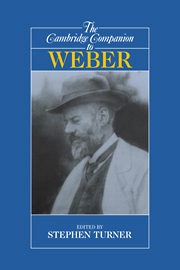Book contents
- Frontmatter
- Introduction
- PART I RATIONALITY, RATIONALIZATION, AND PSYCHOLOGY
- PART II POLITICS AND CULTURE
- PART III RELIGIONS AND THEIR ECONOMIC ETHICS
- 8 Max Weber’s Protestant Ethic and the Spirit of Capitalism
- 9 Max Weber’s Orient
- 10 Max Weber’s Ancient Judaism
- PART IV LAW AND ECONOMICS
- Further reading
- Index
9 - Max Weber’s Orient
from PART III - RELIGIONS AND THEIR ECONOMIC ETHICS
Published online by Cambridge University Press: 28 May 2012
- Frontmatter
- Introduction
- PART I RATIONALITY, RATIONALIZATION, AND PSYCHOLOGY
- PART II POLITICS AND CULTURE
- PART III RELIGIONS AND THEIR ECONOMIC ETHICS
- 8 Max Weber’s Protestant Ethic and the Spirit of Capitalism
- 9 Max Weber’s Orient
- 10 Max Weber’s Ancient Judaism
- PART IV LAW AND ECONOMICS
- Further reading
- Index
Summary
What was it that drove Weber, arguably even to this day the foremost theoretician of modern western society and its historical evolution, to embark on a far-reaching series of investigations of non-western cultures? The question arises inevitably when one considers the sheer scale of Weber's writings on the world religions, all but encyclopedic in scope and displaying an extraordinary capacity of the part of their author in ordering and synthesizing the detailed historical materials involved (a task made all the more impressive given the technical difficulties arising from the undeveloped state of the documentary and scholarly sources at the time). Was all this effort required to establish the correctness of the Protestant ethic thesis? Or, was something further involved that went beyond the earlier problematic and transformed it?
In what follows we shall assume that Weber's studies of the orient, along with his Ancient Judaism, constitute key parts of what was a major expansion and enhancement of the Protestant ethic thesis and concerned the daunting task of grasping the rationalization of the modern world in the context of universal history. Whilst the original umbrella title of the monographs he began to publish in 1915, The Economic Ethic of the World Religions, suggests Weber remained preoccupied with demonstrating via counter-factual comparisons the validity of the Protestant ethic thesis, the contents of the writings subsequently presented as well as the inclusion of several crucial linking essays indicate the problematic had been modified in important ways.
- Type
- Chapter
- Information
- The Cambridge Companion to Weber , pp. 172 - 199Publisher: Cambridge University PressPrint publication year: 2000
- 6
- Cited by



